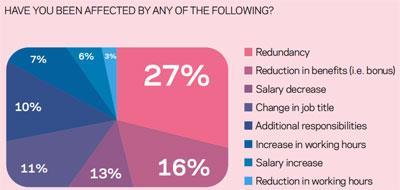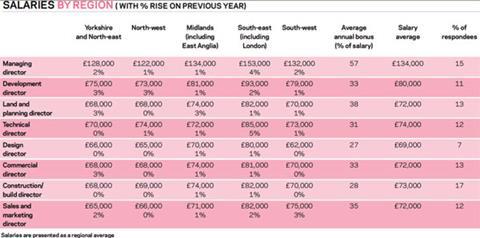Housebuilding salaries have edged up over the past year, according to the PSD Group/��ɫ����TV survey. But the optimism that led to this modest rise has petered out, and fears for the future are growing among employees and clients
It’s a game of two halves, as football pundits are so keen to tell us. For the 2010 housebuilder salary survey, it is actually true.
This time last year, the industry was, unexpectedly, on the up. Flush with new shareholder cash, the listed housebuilders were running around trying to resurrect the land-buying capability they had so viciously slashed the year before, with house prices much higher than anyone had predicted. Salaries began to rise again.

Somewhere between the general election, the euro debt crisis and the emergency budget, however, this rather brittle optimism petered out. House price indices show that, in this industry at least, we’re already in double dip territory. The industry is uncertain once again.
So while the survey has found that wages and bonuses have made up some of the ground they lost during the recession (see tables, right), clients and employees are more worried than they were about the future.
The survey includes a gauge of confidence in the market and average confidence has dropped to 4.78 out of 10, down from six out of 10 in last year’s survey.

Worse still, respondents now expect the recovery to arrive much later than they did last year, with almost half saying recovery won’t happen until 2012 (see PDFs, right). Mark Heald, director at recruitment agency PSD, which conducted the survey, says: “It depends on clients - some are very bullish and some still have their tin hats on. But overall the problem is they just can’t see a definite point where things will improve, they’ve lost any certainty.”
On salaries, the rises in the survey are smaller than the drops recorded during the recession. Average managing director salaries have increased the most - up 2.3%, after dropping 6% in 2008-09. Most salaries have done little more than bounce along the bottom, with no other discipline recording a rise of more than 1.4%. Most of the increases are in London and the South-east.
Bonuses recovered slightly more strongly, particularly for land directors - up 18%, reflecting the scrabble for land-buying capability in the autumn. But the payments are still lower than they were before the recession.
The reason these gains have been so modest, despite nine months of strong growth up to the election, is probably the dampening effect of the number of out-of-work housebuilding staff. Most listed builders cut their workforce by about 40% during the recession and many smaller firms went out of business.
Danny Durkan, boss of contractor and housebuilder Durkan, says there is plenty of talent available in the marketplace. “I have CVs put my way all the time, as well as headhunters contacting us. And these aren’t for junior posts - they’re at director level. There are people out there,” he says.
So are any roles proving difficult to fill? A couple, according to Richard Reynolds, a non-executive director at housing association Orbit. “Land is always difficult in any market - both getting and retaining good staff,” he says. “The best were mostly held on to, even in the recession, and those that weren’t were snapped up a year ago. It’s also tough to find good construction people.”
Reynolds also suggests there may be some moves to return to a more traditional split between salary and bonuses, after housebuilders spent the past decade moving away from the bonus culture of the eighties and nineties, where rewards were often uncapped. “The pendulum maybe swung too far. I think good people like bonus-oriented packages, because if they’re confident they can achieve good things they’ll be rewarded,” says Reynolds.
PSD’s Heald says he is advising employers that they need to pay bonuses in the current market to get the best people. If overall packages are to grow, however, a change of sentiment in the wider economy will be needed. That’s something no one can foresee right now.
Methodology
The PSD Group/��ɫ����TV salary survey was carried out by PSD Group, a specialist in senior-level search and selection across the property sector. There were two elements to the research: an attitudinal survey sent by post, and emails targeting about 1,000 individuals at senior management level across the housebuilding sector. This covered large plcs, private builders, niche developers, registered social landlords and affordable main contractors. For further information, contact Elliot Course, senior consultant in residential development, on 0161-2340 380 or go to
Downloads
When do you think the market will recover in your region?
Other, Size 18.99 kbHave you been affected by any of the following?
Other, Size 30.84 kbHow confident do you feel about the market in the next 12 months?
Other, Size 17.5 kbTable: Salaries by region (with % rise on previous year)
Other, Size 64.29 kbTable: National basic salaries
Other, Size 27.72 kbTable: Annual bonus (as a percentage of salary)
Other, Size 25.63 kb




























No comments yet